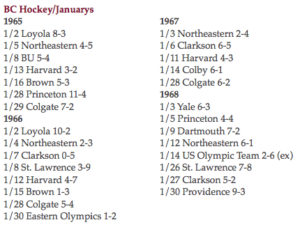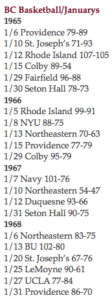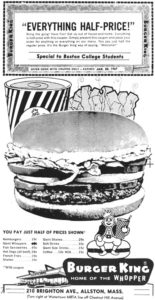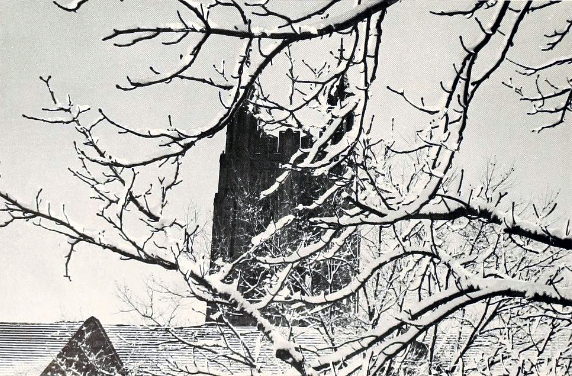Januarys for us at BC began in the doldrums, as we returned to dorms and/or classes from the holiday break, and quickly became busy, as term papers and final exams loomed ahead.
Only six editions of The Heights were published in the four Januarys — two each in 1965 and 1966, one each in 1967 and 1968 — indicative of the attention directed elsewhere. Here’s some of what was going on at BC and in the outside world in Januarys 1965-68.
On campus
 1965
1965
That year’s editors expressed what some, many, all of us felt in their editorial “Angst and January” (January 8). After suggesting that the month be simply eliminated, the editors point to the dual burdens of term papers and finals, along with the external cold. (Though this year’s cold has been historic.) They conclude with the unsurprisingly androcentric view that the only positive aspect of it all is that “. . . beards can grow in freedom . . . .” The January 15 edition included a feature article about the freshmen basketball team, i.e., our classmates.
 1966
1966
Not much. Januarys were busy in the winter sports — basketball and hockey — but we’ll try to talk about those separately.
 1967
1967
Classmates Len Sienko and Bob Abruzzo were part of a trio of students who represented the “Ad Hoc Committee to Oppose the Tuition and Room Increase” in meeting with University officials. The article in the January 13 Heights said Fr. Dorr had agreed to an open forum to “explain” the increases. An ad in the same issue provided a coupon to BC students that would entitle them to half-price at the nearby Burger King on Brighton Avenue. That would certainly alleviate the burden of such “regular” prices as $.19 for a hamburger and $.29 for a giant shake.
1968
Joe Yukica was announced as the new coach of the BC football team. The January 12 Heights carried an interview with Coach Yukica by classmate Reid Oslin. In it, Yukica said something that seems today very anachronistic, but was relevant at the time. Just several days earlier, in late 1967 and early 1968, 16 major college football teams played in 8 bowl games. Comparing BC to those football powerhouses, Yukica said, “Boston College doesn’t belong in bowl games. We don’t give out those 50 scholarships each year, and we are not the type of school to let in every football player that wants to come here.” Saying his teams would be solid, aggressive, and tough, he added, “Let the wins and losses fall where they may.”
The outside world
1965
Alabama quarterback Joe Namath signed with the New York Jets for a then-unprecedented $400,000 contract on January 2. US President Lyndon Johnson announced his plans for a “Great Society” in his January 4 State of the Union address. He was inaugurated on January 20 for his first, (spoiler alert) and last, full term as President after succeeding the assassinated JFK in 1963. Sir Winston Churchill, prime minister of England during World War II, died January 24, two weeks after suffering a stroke, at the age of 90.
1966
A group known previously as “The Warlocks” appeared for the first time with its new name, the Grateful Dead, in San Francisco on January 6. Batman, starring Adam West, made its debut January 12 on ABC. Robert Weaver, on becoming the first secretary of Housing and Urban Development, became the first African-American in a US presidential cabinet. The number of US troops in South Vietnam topped 200,000 for the first time. On January 18, the New York Stock Exchange’s Dow Jones Industrial Average exceeded 1,000 for the first time. Bob Knievel of Montana appeared for the first time leading “Evel Knievel and the Motorcycle Daredevils” in Indio, Calif., on January 23.
1967
Ronald Reagan was sworn in as governor of California on January 2. The song Light My Fire by The Doors is released January 3. On the same day as the first “Human Be-In” was held in San Francisco’s Golden Gate Park, Louis Leakey announced on January 14 the discovery of pre-human fossils in Kenya, evidence of the earliest known ancestors of Homo sapiens. In what was then only unofficially known as the Super Bowl, the Green Bay Packers defeated the Kansas City Chiefs on January 15 to win the first AFL-NFL interleague championship. That same night, the Rolling Stones made their second appearance on The Ed Sullivan Show, but only after agreeing to change the lyrics of their song Let’s Spend the Night Together. Mick Jagger instead sang “Let’s spend some time together.” Albert DeSalvo, convicted as the “Boston Strangler,” accused of the murders of 13 single women in the Boston area, was sentenced January 18 to life in prison. A fire aboard Apollo 1 on its launchpad January 27 killed the three American astronauts inside — Virgil “Gus” Grissom, Edward White, and Roger Chaffee.
1968
US Senator Eugene McCarthy (D-Minn.) announced January 3 he would challenge President Johnson for the Democratic Party nomination. Mattel’s “Hot Wheels” toy cars were introduced January 4. The price of mailing a letter in the US increased from 5 to 6 cents on January 7. The American Telephone and Telegraph Company (AT&T) announced January 12 plans for a universal emergency phone number in the US. For various reasons, the best choice seemed to be 9-1-1. Johnny Cash gave a concert January 13, which was recorded, at Folsom State Prison, California. In the first regular season college basketball game to be broadcast on national television, #2 Houston defeated #1 UCLA, 71-69, at the Houston Astrodome on January 20 in the “Game of the Century.” The battle of Khe Sanh began early the morning of January 21 in South Vietnam. Rowan and Martin’s Laugh-In made its debut January 22 on NBC. On January 23, North Korean forces seized the USS Pueblo, claiming violation of its waters while spying, and imprisoned its crew of 82. A series of widespread attacks by Viet Cong and North Vietnamese forces on January 30 began what would be called the “Tet Offensive.”

